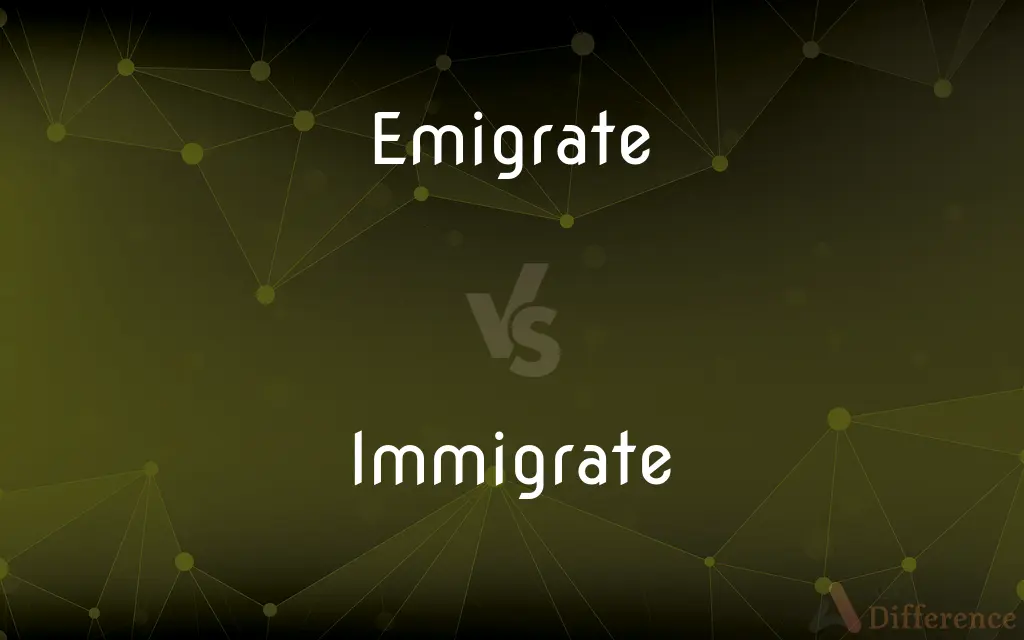Emigrate vs. Immigrate — What's the Difference?
By Tayyaba Rehman — Updated on October 27, 2023
Emigrate is to leave one's country for another. Immigrate is to enter and settle in a new country.

Difference Between Emigrate and Immigrate
Table of Contents
ADVERTISEMENT
Key Differences
Emigrate signifies the act of leaving one's homeland. Immigrate represents the process of entering a new country to live.
Emigrate is from the perspective of the departure point. Immigrate is from the view of the destination.
People emigrate from their country of origin. They immigrate to their new chosen country.
Comparison Chart
Perspective
Leaving one's country
Entering a new country
Focus
Departure
Arrival
ADVERTISEMENT
Usage in Sentence
"John decided to emigrate from Italy."
"Maria chose to immigrate to Canada."
Associated Action
Exit
Entry
Relation to Movement
Outward from a country
Inward into a country
Compare with Definitions
Emigrate
To exit one's country of birth.
He emigrated to pursue education.
Immigrate
Settling in a new country.
They immigrated for a better life.
Emigrate
Departing one's homeland.
The family emigrated during the war.
Immigrate
To move into a foreign country.
He immigrated to the United States.
Emigrate
Movement out of a country.
Many choose to emigrate for better opportunities.
Immigrate
To establish a new home abroad.
He immigrated and started a business.
Emigrate
To leave one's native country.
She decided to emigrate from Brazil.
Immigrate
Entering a country to live.
She immigrated for work.
Emigrate
To leave one country or region to settle in another. See Usage Note at migrate.
Immigrate
To become a resident in another country.
The family immigrated last year.
Emigrate
(intransitive) To leave the country in which one lives, especially one's native country, in order to reside elsewhere.
Immigrate
Come to live permanently in a foreign country
An Australian who immigrated to Britain in 1982
Emigrate
To remove from one country or State to another, for the purpose of residence; to migrate from home.
Forced to emigrate in a body to America.
They [the Huns] were emigrating from Tartary into Europe in the time of the Goths.
Immigrate
To enter and settle in a country or region to which one is not native. See Usage Note at migrate.
Emigrate
Migratory; roving.
Immigrate
To send or introduce as immigrants
Britain immigrated many colonists to the New World.
Emigrate
Leave one's country of residence for a new one;
Many people had to emigrate during the Nazi period
Immigrate
(intransitive) To move into a foreign country to stay permanently.
Emigrate
To seek residence elsewhere.
They emigrated in search of freedom.
Immigrate
To come into a country of which one is not a native, for the purpose of permanent residence. See Emigrate.
Immigrate
Migrate to a new environment;
Only few plants can immigrate to the island
Immigrate
Introduce or send as immigrants;
Britain immigrated many colonists to America
Immigrate
Come into a new country and change residency;
Many people immigrated at the beginning of the 20th century
Common Curiosities
Is immigrating always voluntary?
Mostly, but sometimes it's due to compelling circumstances.
Can emigrants return to their home country?
Yes, emigrants can return or even live between countries.
Is emigration always permanent?
Not necessarily, it can be temporary.
Are emigrants considered expatriates?
Yes, emigrants living abroad can be called expatriates.
Can one emigrate without immigrating?
Theoretically, yes, if they don't settle in another country.
Do immigrants always have citizenship in the new country?
No, citizenship can take time and isn't automatic.
Can emigration lead to dual citizenship?
In some cases, yes, if the person naturalizes in the new country.
Are immigrants always refugees?
No, refugees are a specific category of immigrants fleeing danger.
Do all countries accept immigrants?
Immigration policies vary widely from country to country.
Do emigrants lose their native citizenship?
It depends on the laws of the respective countries.
Is the process of immigration complicated?
It can be, depending on the country's laws and regulations.
Can students studying abroad be considered immigrants?
Generally, they're considered international students, not immigrants.
Do immigrants contribute to the economy?
Yes, they often significantly contribute to their new country's economy.
Can a person emigrate for political reasons?
Yes, political reasons are a common cause for emigration.
Do emigrants have a right to return?
Usually, yes, unless they renounce their original citizenship.
Share Your Discovery

Previous Comparison
Sensuous vs. Sensual
Next Comparison
Educe vs. InduceAuthor Spotlight
Written by
Tayyaba RehmanTayyaba Rehman is a distinguished writer, currently serving as a primary contributor to askdifference.com. As a researcher in semantics and etymology, Tayyaba's passion for the complexity of languages and their distinctions has found a perfect home on the platform. Tayyaba delves into the intricacies of language, distinguishing between commonly confused words and phrases, thereby providing clarity for readers worldwide.














































